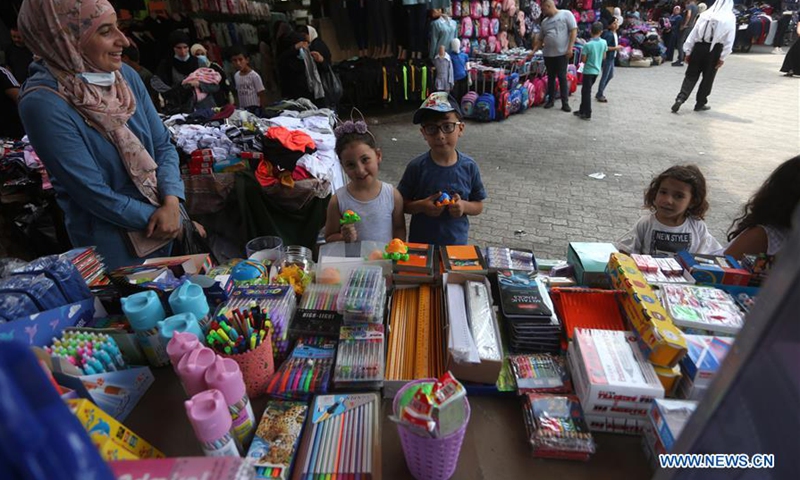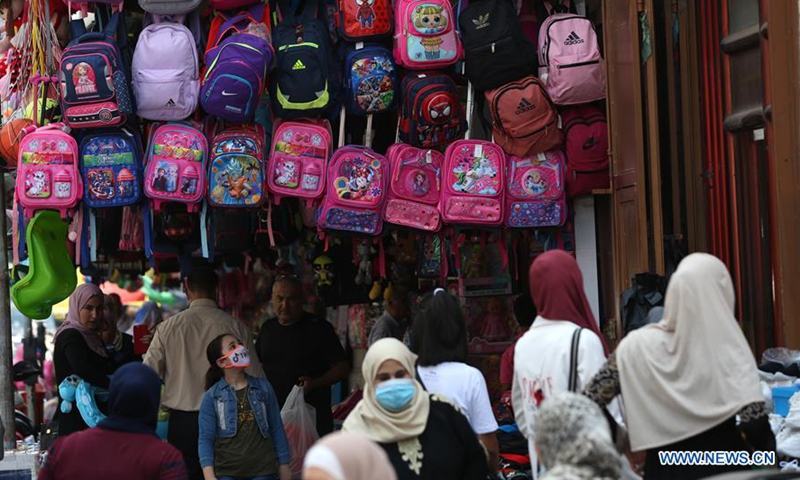West Bank's markets suffer from recession ahead of new school year
Source: Xinhua Published: 2020/9/3 11:19:19

People do shopping at a market ahead of the new school year in the West Bank city of Nablus on Sept. 1, 2020. (Photo by Ayman Nobani/Xinhua)
Palestinian merchants from the West Bank have complained about the local markets' recession ahead of the new school year amid the COVID-19 pandemic.
On Sept. 6, Palestinian students are slated to return gradually to their schools. Each student will attend classes for only three days a week as part of the precautionary measures to contain the virus.
Many Palestinians rushed to the local markets that have already been crowded to buy the basic needs for their children.
However, Hamada Qoddous, a merchant from the West Bank city of Ramallah, told Xinhua that this year, he feels the sharp decline in revenue compared with the previous years.
The 36-year-old man said that the deteriorating economic conditions have prevented the majority of the customers from purchasing their basic needs.
In an attempt to sell more, the man has been forced to reduce the prices on his goods piled up in his stores. He hopes that the Palestinian Authority (PA) employees' payment will help people to stay afloat.
Some merchants told Xinhua that the outbreak of the novel coronavirus in the Palestinian territories has negatively affected the economic situation in the area, which led to the weak purchasing power.
Over the past two days, the PA has released 50 percent of its government employees' salaries in the West Bank and the Gaza Strip.
This is the third time that the PA has been forced to release partial payments of employees' salaries since last May. On June 3, the PA refused to receive the tax revenue dues from Israel because the Palestinian leadership ended all agreements with Israel because of its annexation plans to annex parts of the West Bank.

People do shopping at a market ahead of the new school year in the West Bank city of Nablus on Sept. 1, 2020. (Photo by Ayman Nobani/Xinhua)
Samer Sowan, a PA's employee from Nablus city, told Xinhua that the deducted salary does not allow him to buy school stationery and clothes for his three children.
The 42-year-old man said that the situation does not allow him "to buy anything, especially since we are required to pay school fees and provide other basic needs."
He called on the Palestinian government to provide school supplies for all students, who are suffering from poverty in the West Bank.
Suhair Akkel, another customer from Ramallah, told Xinhua that the markets' situation has reflected the worsening economic conditions in their area.
The 40-year-old mother of three said that she just bought the necessary goods for her children as "we really do not know if schools will continue to operate," adding the Education Ministry has not yet announced its educational plan.
For his part, Marwan Awartani, the Palestinian Minister of Education, told Xinhua that the ministry, in cooperation with the Ministry of Health, has established an early warning system, to track the virus in real-time when the educational process resumes.
The early warning system would allow the immediate follow-up of any infection cases among school staff or students.
Palestine has recorded till Tuesday 30,490 COVID-19 cases with 180 deaths in the West Bank, East Jerusalem and Gaza Strip.
Posted in: MID-EAST